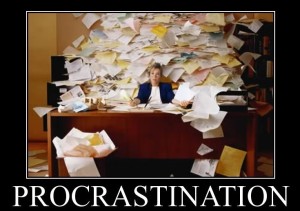Procrastination, the habit of putting tasks off to the last possible minute, can be a major problem in both your career and your personal life. Side effects include missed opportunities, frenzied work hours, stress, feeling overwhelmed, resentment, and guilt. Sometimes you’ll procrastinate because you’re overwhelmed with too much on your plate, and procrastination gives you an escape. Other times you’ll feel tired and lazy, and you just can’t get going. Picture this: One day your kitchen bench is clutter-free and a calming beacon of white space. The next, there are three separate piles of papers, homework, catalogues, bills, handbags, mobile devices, random hairclips and Lego blocks scattered across the surface. You don’t understand where it’s come from, but there it is. Sitting in the middle of your kitchen like it’s always been. Taunting you and your futile efforts at simplicity. That is Clutter Creep. It slowly leeches in to your clutter-free spaces; frustrating you and making you feel like this idea of a tidy, uncluttered space is a hopeless prospect. This feeling of being overwhelmed with the everyday clutter in our lives often resorts to, “ugh, I can’t deal with this today. I’ll take care of it tomorrow!” Eventually, your tomorrow begins to look like this:
Once your physical space begins to look like this, your mental state has also become a cluttered mess! How does this happen? One day your life is neat and in order and before you know it, everything is out of order and chaotic. The behavior pattern of procrastination can be triggered in many different ways, so your reasons might not always be the same. Why do we procrastinate?
- Stress – When you feel stressed, worried or anxious, it’s hard to function and be productive. Instead of burying ourselves in our work, we oftentimes, will use procrastination as a coping mechanism.
- Overwhelmed – Sometimes, we have more items on our “to-do” list than we can reasonably complete. This can quickly lead to feeling overwhelmed which, ironically, will cause us to procrastinate when we can least afford it. It’s like your brain has shut down from cooperating with what it knows to be an unreasonable request!
- Laziness – We all suffer from this, from time to time. Often, we’ll procrastinate because we feel too physically or emotionally drained to tackle the situation. When we begin to feel lazy, even simple tasks seem too much work because our energy level is lower than the energy needed to complete the task. If we’re not careful, this will spiral into depression and can lead to “hoarding.”
- Poor time management skills – Do you ever find yourself falling behind because you’ve overslept, because you’re too disorganized or certain things just “fell through the crack?” Bad habits, such as these, can unintentionally lead to procrastination. Unfortunately, this reason can lead to certain disruption in life if you miss opportunities or if you miss cut off dates!
We don’t always realize how our mental state can manifest itself in our physical state. In order to conquer procrastination, we must first determine the root cause, and to determine that, we must focus on what’s going on in our head. What’s causing this state of confusion and chaos?
Whether it be your closet or your desk, excess things in your space can have a negative impact on your ability to focus and be productive. It has a tendency to overload your senses, which can make you feel stressed. Since stress can be a cause of procrastination, a vicious cycle begins! What to do? What to do?
- Recognize that you’re procrastinating. It’s impossible to correct a problem or situation if you don’t admit that there is a situation to correct! If you’re honest with yourself, you probably know when you’re putting something off. Are you concentrating on minor things to avoid something that’s major? Does the same task continually carry over on your “to-do” list?
- Break the task down into smaller goals. If you look at cleaning out your closet or cleaning off your desk in one attempt, you’ll never start. Instead, break it down into smaller tasks. For instance, start with shoes and separate your shoes into piles of good, give aways, and throw aways! Separate your desk into piles of throw away, to read, action needed. You will be able to see your progress and this will give you a sense of accomplishment.
- Eliminate the temptation to do something by designating a specific allotted time to “take care” of some things. Decide that you’re going to spend one hour, for example, a day to declutter and be committed to that hour. All habits, whether good or bad, take a certain amount of commitment to become a pattern.
We are all familiar of the procrastination phenomenon; in fact, we’ve all been guilty of it at some point. When we procrastinate, we squander away our free time and put off important tasks we should be doing until, sometimes, it’s too late. Don’t let procrastination take over your life. It’s a bad habit that eats us away and prevents us from achieving our life’s greatest potential.




No comments yet.